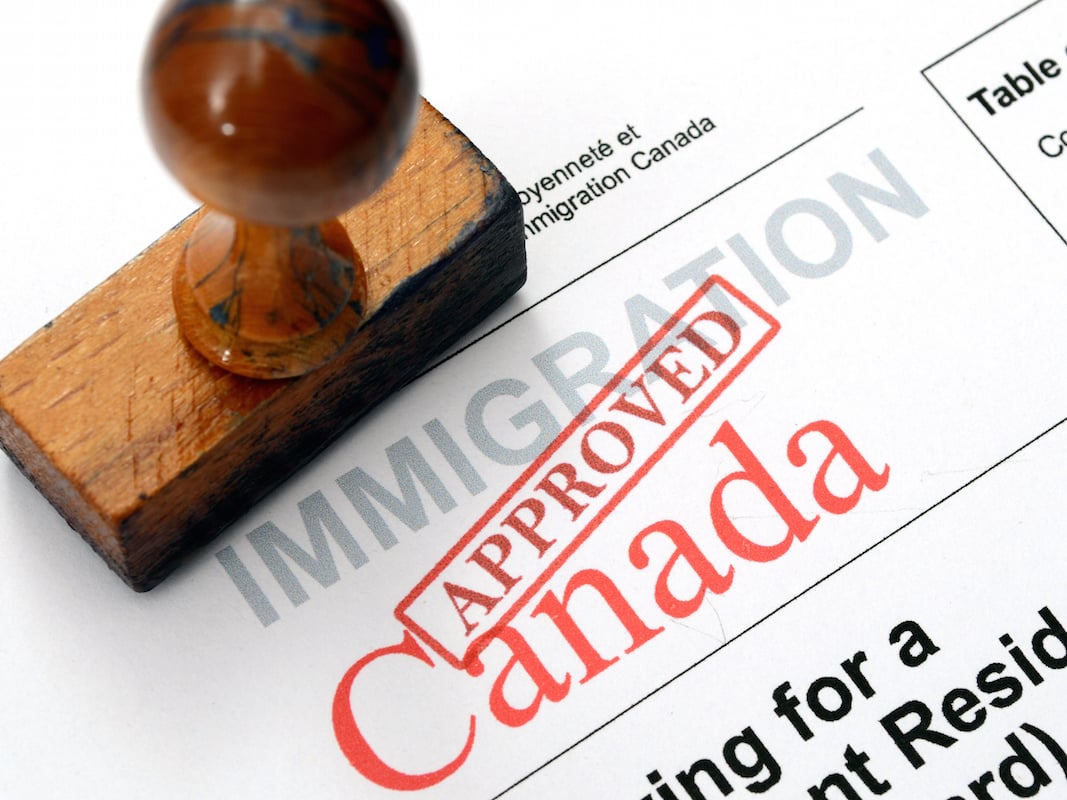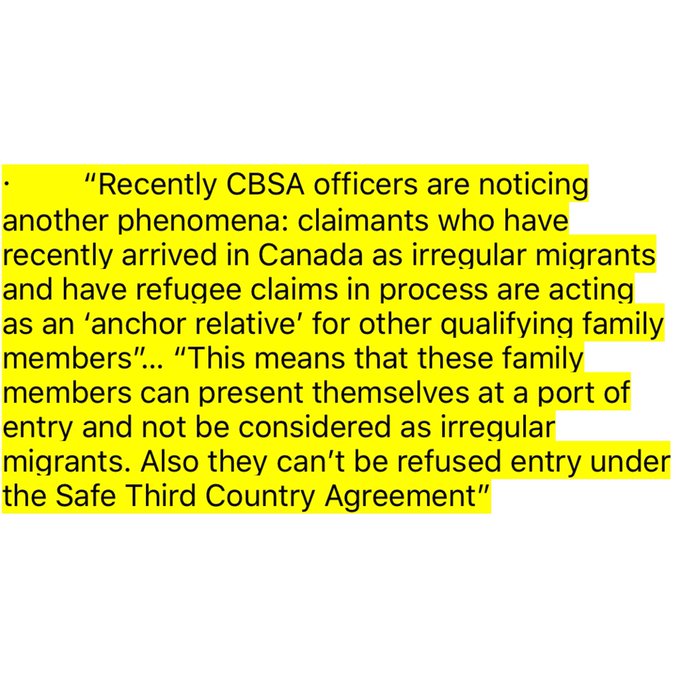Canadian border officers are reporting on what they call a "phenomenon" on the migrant front: irregular border crossers acting as "anchor relatives" for those making refugee claims at official points of entry.
The Canada Border Services Agency (CBSA) says people who have entered the country through irregular migration can make use of an exception in the law to facilitate the entry of family members — even when their own claims haven't been adjudicated.
"Recently, CBSA officers are noticing another phenomenon: claimants who have recently arrived in Canada as irregular migrants and have refugee claims in process are acting as an anchor relative for other qualifying family members," says an information package provided to the Parliamentary Budget Officer (PBO) by the CBSA.
"This means that these family members can present themselves at a port of entry and not be considered as irregular migrants. Also, they can't be refused entry under the Safe Third Country Agreement (STCA)."
The STCA is a Canada-U.S. treaty meant to manage the flow of refugee claimants across the shared border. It states that most people seeking refugee status in either country must make their claim in the first 'safe' country they arrive in — either Canada or the United States.
A spokesperson for Public Safety Minister Ralph Goodale's office told CBC News the data shows no evidence "that there is a trend of increased 'anchor relatives' being used to get around the Safe Third Country Agreement."
Scott Bardsley cited figures showing the number of asylum claimants who were able to take advantage of an exception in the STCA — either because of the presence in Canada of 'anchor relatives' or because of some other exception to the treaty — dropped from an average of 531 per month in 2017 to an average of 318 per month in 2018.
'Loophole in a loophole'
Conservative immigration critic Michelle Rempel tweeted about the issue late Wednesday, calling it a "loophole in a loophole" and asking Prime Minister Justin Trudeau how many might use it to claim asylum in Canada in the coming years.
In an interview, Rempel said the Liberal government needs to explain whether the provision is fair, given restrictions on sponsorship for other immigration and refugee claimants.
"Essentially what would happen here is that if you've illegally entered the country and claimed asylum after being in the U.S., if you have family members in the U.S. or can make it there, even if you don't have permanent residency status they could still claim asylum through the exception in the Safe Third Country Agreement," she said. "I do think this is something the government should be alerted to and concerned about."
The Conservatives have been calling on the government to apply the Safe Third Country Agreement to the entire border, eliminating an exception for those entering the country outside of official border crossing points.
Michelle Rempel✔@MichelleRempel
How many relatives of those who have illegally crossed the border from the USA, then subsequently claimed asylum in Canada, are you projecting will claim an exemption under the STCA and also claim asylum in Canada in the coming years, @JustinTrudeau? #LoopholeInALoophole
Janet Dench, executive director of the Canadian Council for Refugees, said the provision was included in the STCA in order to keep families united. Some families could be separated while fleeing conflict or persecution, she said, or some might choose to have one member cross irregularly before other family members come in through official points of entry.
"In some cases, you'll have a family who wants to come and then realize the (STCA) is going to block them, so they say, 'We'll send one member of the family across, make a refugee claim then the other members of the family will be able to go to a regular port of entry and be able to join the person in Canada,'" she said.
Grandparents, siblings, nephews allowed
The CBSA document says the provision applies not just to nuclear families but to parents, grandparents, siblings, aunts, uncles, nephews and nieces.
The PBO requested financial and other information from federal departments and agencies in order to carry out a financial cost analysis of the recent surge in asylum seekers. Responses from four federal departments and agencies were tabled with the immigration committee.
In response to a request from Conservative MP Larry Maguire, PBO Jean-Denis Fréchette agreed to take on a global accounting exercise to add up the costs incurred to date related to the boom in asylum seekers entering Canada outside official border points, and how much the stepped-up pace of irregular migration might cost in the future.
Tenfold spike in asylum-seekers
For the first time, the RCMP has provided numbers of asylum seekers intercepted outside official border points for 2016, showing a tenfold spike in just one year.
In 2017, 20,593 asylum seekers were intercepted, compared to just 2,486 in 2016. Previously, the RCMP did not track asylum seekers separately from others who were intercepted outside regular crossings and who were engaged in other activities, such as human smuggling.
From Jan. 1 to July 15, 2018, there were 11,420 interceptions of irregular migrants at the border. Officials have noted a declining rate of irregular border crossings in recent months.
The PBO had asked for five-year projections on the number of irregular border crossers, but all departments declined to give estimates, arguing that the volumes are too unpredictable.
"Given that migration and refugee movements are influenced by a complexity of different factors and are difficult to predict, costs for future year projections are not available at this time," Immigration Minister Ahmed Hussen said in a letter to the PBO. "The department will, however, continue to monitor volumes and migration patterns closely, in order to refine financial impacts."
The CBSA, in its written reply to Fréchette's request for information, said that "forecasting irregular arrivals for the coming years is difficult" because "a number of external factors ... influence the migration of persons seeking protection.
"This is further complicated when attempting to forecast how many will present themselves at a port of entry versus how many will attempt to enter between the ports. The primary reason claimants enter between the ports is because they do not meet an exception or exemption to the Safe Third Country Agreement."
'Fluid and dynamic'
There are various exceptions to the STCA's ban on seeking refugee status in one country after arriving in another: unaccompanied minors, holders of work or student visas — or those who have a family member already in Canada as a citizen, a permanent resident or a refugee claimant.
The RCMP said they could not provide projections of irregular arrivals or financial expenditures, calling the situation at the border "fluid and dynamic."
In an open letter to Frechette, RCMP Commissioner Brenda Lucki said much of the border runs through wilderness areas, far from communities or major centres, so the RCMP take a "layered approach" to border operations.


























